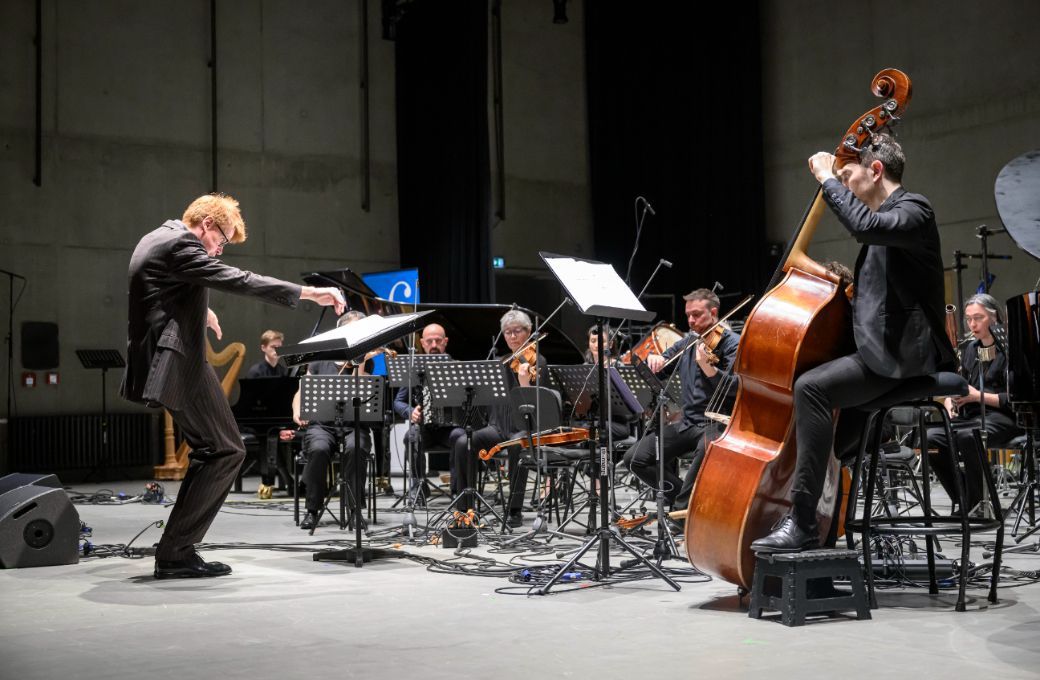Klangforum Wien wrapped up a three-year residency at Prague Spring in style, showcasing two of the finest distaff composers of the late 20th and early 21st centuries: Rebecca Saunders and the late Kaija Saariaho. Saunders was on hand for performances of four of her pieces over two nights, rendered with ringing authority under the exacting baton of composer and conductor Enno Poppe. One of Poppe’s own pieces, a quintet of commissions by the festival and an audacious excursion into a microtonal universe, rounded out a brain-bending weekend.

Saunders’ music is bold, uncompromising and expansive, rocketing from small murmurs to violent outbursts of sound. Her Fury II concerto opened the weekend with double bass player Evan Hulbert giving rumbling cues to a small ensemble that responded with a series of aural collisions, music that sounded at times like it was being shredded – not unlike the string players’ bows. Her solo piano piece to an utterance was no less aggressive, hammered out with gusto by Joonas Ahonen, who combined raw power with technical virtuosity. Had the keyboard crashed to the floor under his relentless pounding, it would have been no surprise.
The full ensemble took on two particularly demanding works the first night. Poppe’s Speicher VI is built around high-pitched, piercing whistles in the woodwinds, which trade lines with deep strings. Dizzying sonic effects filled out a demanding piece that meandered at times but otherwise set a very high bar, both in the writing and a meticulous performance. Saunders’ Scar is an examplar of her ability to turn seemingly random explosions of noise into a living, breathing organism, enhanced in this performance by Poppe, who maintained a totally clear, transparent sound throughout the chaos.
Saariaho’s Solar opened the second night, with Poppe putting an icy edge on music that always seemed on the verge of floating away. Crystalline playing neatly defined layers of sound and rhythm, and flawless execution kept a tight rein on the rapid changes in tone and character in the final few minutes of the piece. The evening closed with Nether for soprano and orchestra, with Juliet Fraser wearing a mic so that none of the hissing, scratching, shrieking sounds that comprise much of her vocals was lost. What text there was comes from Molly Bloom in James Joyce’s Ulysses, rendered by Fraser with a ferocity that matched the musical thunderstorm raging behind her.
The commissions could have been soft filler between two challenging works, but festival organizers went outside the usual circles of Czech and Slovak composers to tap fresh talent focused on experimental music. Though limited to four minutes, the pieces offered substantive temporal and spatial studies, with the ensemble giving them the same care and intensity that they devoted to the major composers.
Georg Friedrich Haas’ monumental 11,000 Strings capped the weekend, with the ensemble spread out in a large circle along with 50 pianists playing pianos tuned in microtones. The piece creates a vast, turbulent soundscape that ranges from delicate trilling on multiple keyboards to buzzsaw electronics that roared around the hall like an airplane. In both spirit and execution, it was a fitting coda to a model residency that offered masterclasses, workshops, interesting discussions with first-rate composers, generous helpings of local composers and, above all, sterling performances by musicians who seriously know how to play contemporary music.


